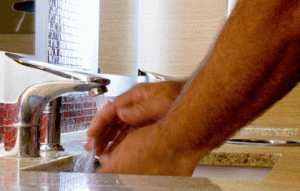Dyshidrotic Eczema

Wash hands gently: To prevent flares from hand washing, be sure to remove your rings, use lukewarm water, and wash with a fragrance-free cleanser.
Dyshidrotic eczema: Tips for managing
Making some simple changes to your everyday routine can help clear your skin and prevent flares. Dermatologists recommend the following to their patients who have dyshidrotic eczema (DE):
-
-
- Wash skin with DE gently: When washing, you’ll want to:Remove rings: Always remove these before washing your hands. If the skin beneath your ring gets wet and stays damp, the DE can flare.
Use lukewarm water: Using lukewarm water every time can help prevent flares.
Wash with mild, fragrance-free cleansers: Skip the antibacterial soaps, waterless hand sanitizers, and deodorant soaps, which can cause DE to flare.
Even when the eczema clears, you’ll want to continue gently washing the skin that had eczema. This will help prevent flares. - Apply moisturizer frequently: You’ll want to apply moisturizer:
- After washing
- Throughout the day when your skin feels dry.Dermatologists often recommend using a product called a barrier repair cream that contains dimethicone. This product allows skin to breathe. It also helps relieve itch and creates a barrier to protect you from things that can irritate your skin.If you opt to use another moisturizer, make sure it is:
- Thick and creamy
- Fragrance free (“Fragrance free” and “unscented” are different.)
- Something you like enough to use frequentlyAvoid moisturizer that is thin and runny as are many lotions. Lotions contain a lot of water, which can worsen DE.
- Learn to manage stress really well: Some patients find that they can clear their skin by practicing a stress-reduction technique and treating their skin as directed.It can be helpful to continue finding ways to relieve your stress. Many people say that the DE returns when they feel stressed.
- Try to avoid scratching: Anything you can do to reduce scratching is helpful because scratching tends to worsen DE.
- Avoid dry environments and hot conditions that cause you to sweat a lot: Both heat and dryness can trigger flares.
- Ask your dermatologist if something could be triggering your DE. If the DE won’t clear, you may:
- Have an allergy
- Be irritating your skinYour dermatologist can ask questions to find out if something is irritating your skin. Allergy testing can find out whether you have allergies.
- Avoid what causes an allergic reaction and what irritates your skin. If either allergens or irritants are the problem, avoiding them may be necessary to clear your skin — and keep it clear.
- Wear gloves to protect your hands: Many things that touch your skin can cause DE to flare. Water, detergents, and household cleaners are a few.To protect your hands, you’ll want to put gloves on before you get your hands wet and before touching something that irritates your skin. Dermatologists recommend the following:
- Wear 100% cotton gloves (hands won’t get wet)
- Wear 100% cotton gloves under waterproof gloves (wet work)
- Remove your rings: Rings can irritate your sensitive skin. To reduce irritation, dermatologists recommend that you remove your rings BEFORE:• Washing your hands
• Applying moisturizer
• Going to sleep - Wear moisture-wicking socks: If you have dyshidrotic eczema on your feet, this will help keep your feet dry.
- Wash skin with DE gently: When washing, you’ll want to:Remove rings: Always remove these before washing your hands. If the skin beneath your ring gets wet and stays damp, the DE can flare.
-
References:
Habif TP, Campbell JL, et al. “Pompholyx” (card #16). In: Dermatology DDxDeck. Mosby 2006.
Miller JL, Hurley HJ. “Diseases of the eccrine and apocrine sweat glands.” In: Bolognia JL, Jorizzo JL, et al, eds. Dermatology. Mosby Elsevier 2008. p. 543.
© 2026 American Academy of Dermatology. All rights reserved. Reproduction or republication strictly prohibited without prior written permission. Use of these materials is subject to the legal notice and terms of use located at https://www.aad.org/about/legal

